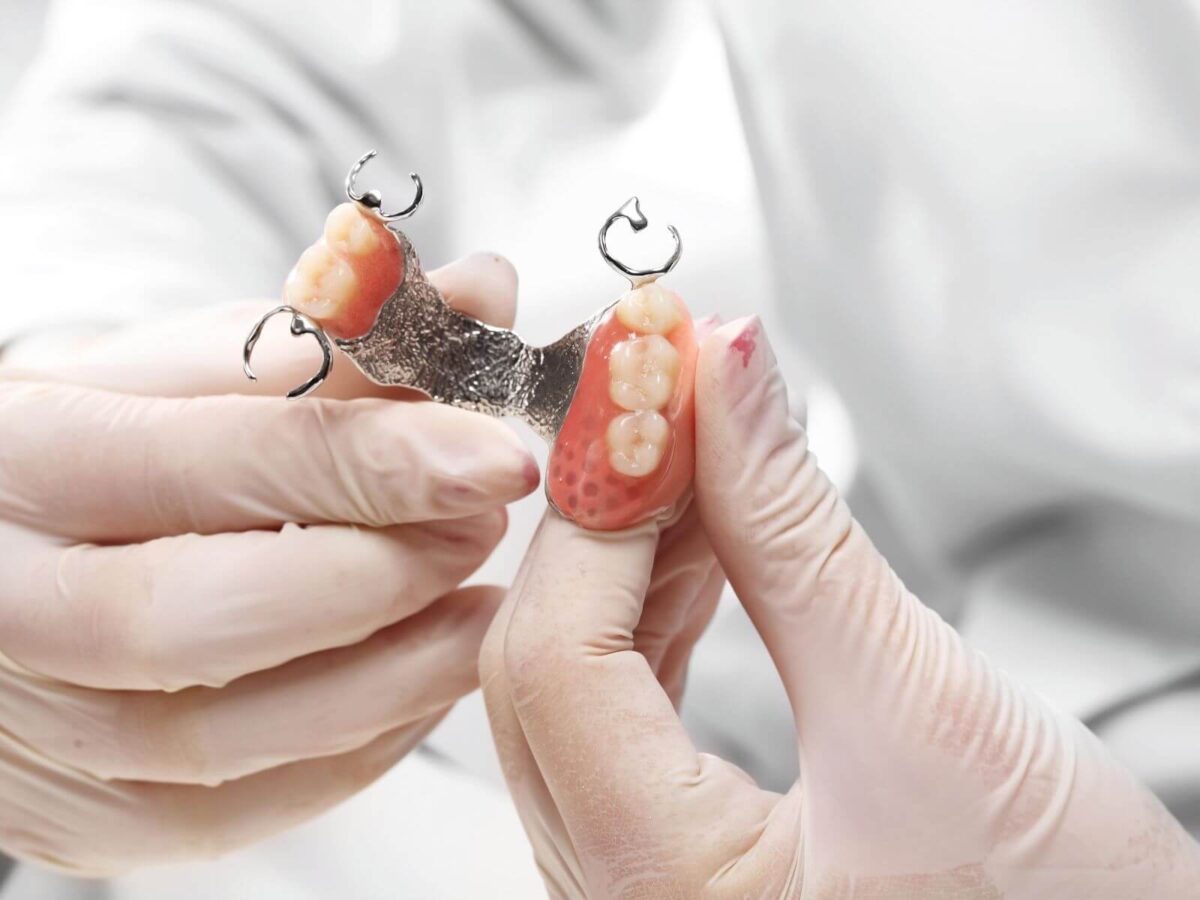Blog
Dental hygiene tips for healthy teeth & gums

Common Mistakes To Avoid When Caring For Your Dentures
Dentures help many patients regain their oral functions while building their self-assurance. Careful maintenance and good habits help dentures survive longer, but poor treatment habits make them wear out faster. Denture wearers develop bad practices that require expensive dental work or force them to get new dentures early.
Why Denture Care Matters
Your dental and oral health improves because dentures enable you to eat and communicate easily while keeping your smile comfortable. You can keep your dentures alive longer when you take good care of them, but you need to handle them regularly throughout the day.
The dentures function better and need less repair work because of proper care
- Maintain a comfortable fit
- Their oral and gum health stays free from disease and infection
- Maintain your smile in a natural and good condition
- Poor denture maintenance produces dental pain along with damaged underlying structures, plus a halitosis manifesto
Types of Dentures
Complete dentures replace all missing teeth in a single tooth row or both rows and comprise acrylic tissue bases paired with artificial tooth replicas.
Partial dentures help oral health when natural teeth survive in the mouth at a minimum. A metal or acrylic framework secures replacement teeth in the gaps left by missing teeth.
Dental implants help dentures stay in place more effectively. During surgery, the dental specialist fits dental implants into the jawbone and links dentures directly to these implants to build reliable anchoring. Dental implants strengthen the jaw by preventing bone loss in that area.
How to Clean Your Dentures Properly
- Pick special denture cleaners over toothpaste that is too rough for denture surfaces. Dentures need special cleaning solutions that should replace regular soap or paste.
- You should immediately place your dentures in warm water to keep food from sticking.
- Daily Cleaning Routine: Brush your dentures gently daily using a soft-bristled brush. Brushing your tongue and gums during your dental hygiene process is included.
Our team will suggest quality products to take care of your dentures.
How to Avoid Common Denture Mistakes
1. Improper Cleaning
Denture wearers often do not care for their dentures correctly since bacteria builds up on the devices and causes mouth problems.
2. Sleeping with Your Dentures On
Sleeping with dentures placed over your gums can create discomfort and slow saliva production, raising the chance of gum or tissue damage.
The Right Routine
You should remove your dentures at night and place them in a denture-safe solution to keep the materials hydrated and shaped correctly.
Allowing your gum tissues to rest decreases your likelihood of developing painful areas on them.
When you cannot find comfort with your dentures when removing them during sleep, let our staff examine them for better adjustments.
3. DIY Adjustments
Trying home-based denture fixes is bad since it may hurt your appliance and create new problems.
Trust the Experts
Visit Cain Denture Centers for examination when dentures do not fit well or create pain during normal use. Our professionals will modify and adjust dentures for better stability to keep them comfortable for you.
The warranty on your dentures may become invalid, plus you could encounter additional dental problems from trying to repair them yourself.
4. Skipping Regular Denture Check-Ups
Having no natural teeth requires seeing a dentist regularly to uphold oral health and maintain your dentures’ excellent status.
Benefits of Regular Check-Ups
- Our team will assess your gum health and evaluate if your dentures still fit properly.
- Through regular professional cleaning sessions, dentures receive extended life duration.
- The maintenance of your oral health requires appointments scheduled every six months.
5. Neglecting to Replace Old Dentures
A person should expect dentures to have a finite lifetime. The natural wear and tear and ill-fitting or cracking of dentures may result in discomfort and failure to maintain proper appearance.
When to Replace Your Dentures
The lifetime of dentures should last five to seven years based on the amount of daily use and wear. Watch for continuing pain and check for any denture cracks or difficulties with eating.
Professional staff members can assist you in understanding when denture replacement is needed, followed by complete replacement process guidance.
6. Ignoring Sore Spots or Pain
Your dentures indicate through discomfort that they require attention from a professional. Spare spots left untended develop into severe issues that harm your gums and weaken your bones.
Address Issues Early
You should make an appointment immediately when any difficulty develops.
Our technicians modify dentures to match your gum shape and make wearing them more bearable.
7. Not Using Adhesives Correctly
The improper application of denture adhesives leads to problems even though they strengthen denture stability. Denture adhesives become problematic if you apply them in excess because they obstruct cleaning but produce insufficient adhesion results.
Tips for Using Adhesives
Place an equal distribution of a thin amount on clean and dry dentures.
Follow the specified and recommended amount shown on the denture adhesive packaging.
Seek our evaluation as we assess your denture adhesive use if you depend on them for stability.
Additional Tips for Denture Care
1. Handle Broken Dentures With Caution
Attempting to repair broken or chipped dentures using glue or other artificial adhesives at home is strongly discouraged. The denture material could face harm, while toxic substances harm its structure. Professional denture repairs need to be done by your dental professional.
2. Watch for Signs of Irritation
The improper fit of your dentures may cause your gums to become inflamed or sore while showing redness. Early identification of this problem helps stop worsening oral health conditions.
3. Store Dentures Safely
Putting dentures in a covered water-filled or denture solution container creates the best storage method. Dentures must remain covered because contact with air will lead to damage from drying out.
Taking good care of dentures preserves both your mouth’s health and dentures’ lifespan. The correct storage methods and the right denture use help keep dentures functional and comfortable until their estimated lifetime ends.
Conclusion
Daily use of your dentures requires proper maintenance for optimal results. The six everyday practices you avoid will positively affect your denture quality and service life. Better denture care practices require your investment of time together with help from our expert team if you need any guidance or help.
Make arrangements for a checkup if you haven’t visited the dentist recently. Help others learn about these damaging habits by sharing this information so they can obtain better denture care practices.


